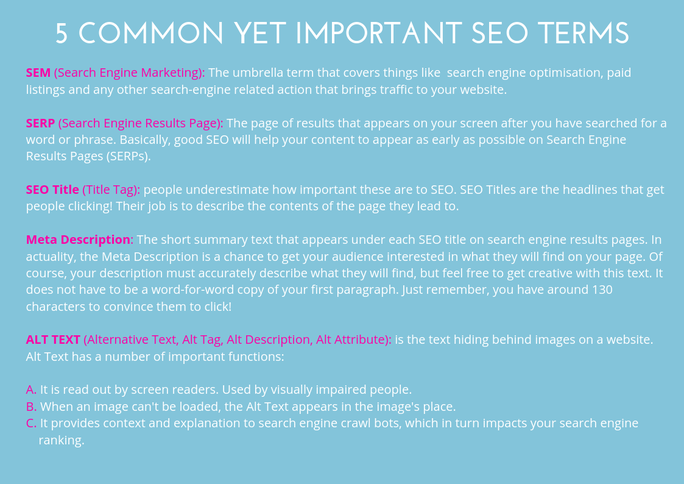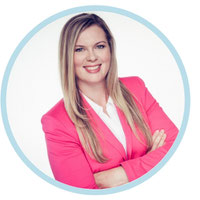
In the age of the internet, Search Engine Optimisation, or SEO for short, is a key component of any online marketing strategy. By now most people have heard of SEO and know that it is important. However, dig a little deeper and we find that many people have just a vague idea of what it actually is and how to use it. In this article I will explain in simple terms the basics of SEO, why we need to do it, how to set realistic goals, and I will go over a few key terms that pop up over and over again.
WHAT IS SEO?
Simply put, SEO is working out how your target audience thinks and the terms they might use to search for your product or service online. Of course, there is a wee bit more to this process, but the bottom line is, the better you know your audience, the better your results will be.
An easy way to get started, is to make a list. Brainstorm all of the terms your target audience might type into Google if they were to look for your product or service. Write down anything and everything that comes to mind. What you then have is a list of potential keywords.
Now, as someone who provides SEO services, my next step would be to pop all those words into a keyword testing programme. This programme will tell me how often each word is searched, how much competition there is for that word (how many other pages are optimised for that word) and will suggest similar words that perhaps I hadn’t thought of. We call this step ‘keyword testing’. Keyword testing allows us to judge and compare which keywords have the best chance of reaching our target audience.
On the other hand, perhaps you have a very restrictive budget or no budget at all. Not to worry – we can use your keyword list anyway. Of course, without testing you cannot be sure that the words you have chosen are the best ones, but some optimisation is absolutely better than none and this list gives you a good place to start.
"SEO is working out how your target audience thinks"
NOW WHAT?
The next step is to work your selected keywords into your content. The trick here is to make sure that your keywords fit into your content as naturally and logically as possible. In the past, people just sprinkled keywords will-nilly into their content and all was fine. These days that just doesn’t cut it.
Algorithms have evolved to the point where they can tell the difference between natural sounding content and when someone has just whacked a keyword in for the sake of it. On top of this, you want to make sure your keyword appears a number of times in your content. However, beware of keyword-stuffing (a term used to describe the overloading of keywords in text). This will throw up a big red-flag and do more damage than good to your ranking.
Of course, there are a bunch of formulas and benchmarks for optimising your content with keywords. To go over them all would take us hours and although there are some tricky parts, it is my belief that just about anyone can learn the basics of SEO. Having the skills to monitor and make adjustments yourself can save you time and money and ensure you maintain the best possible rank on search engine results pages.
WHY IS SEO IMPORTANT?
Ask yourself this, what is the use of creating a beautiful website, interesting content, videos and so on, if no one finds you?
When you develop an online presence, you do so to be found. You create a website so that people can learn about your product or service and ultimately, become your customers.
Yes, ten years ago it was possible that your page ranked on google (or any search engine) without being properly optimised. But the chances of this happening now are getting slimmer every day. Yes, even without intentional optimisation you will naturally build-in some kind of keyword profile, but this is very hit and miss. Just imagine what you could do with a wee bit of effort, especially in large or popular markets (think English schools in Vancouver, London or New York).
Let’s take a closer look at the London example. In London there are over 100 British Council accredited English
language schools. If a student was looking for a course in London, it is fair to guess that they might type in ‘English school in London’. A google results page usually lists around 10
results and, depending on the criteria, up to 4 ads per page. Research regularly shows that 90% of people do not search further than the first page of results. This means that of those 100
schools, a maximum of 14 schools (or more accurately listings) are taking the lion’s share of the traffic! The only way to improve your chances of being clicked-on by students is to work towards
appearing on that golden first page. This is why SEO is important.
"When you develop an online presence, you do so to be found"
WHAT SHOULD I EXPECT?
Unfortunately, these days, first position on the first page of google is a bit like searching for the pot of gold at the end of the rainbow. That’s not to say it’s impossible. It just takes time, commitment, research, monitoring and a dollop of luck to boot. Keeping this in mind, I do my best to help my clients to set realistic goals. If you are currently on the 12th page of google, I’m sorry but you are unlikely to jump to the first entry on the first page. At least not right away.
Many people mistakenly believe that once their website is optimised that it is done forever. In reality, SEO is not something you do once and never touch again. Keyword popularity changes over time and even more regularly, the google (and other search engine) algorithms adapt to consider new technology and qualitive markers. This means that you need to look after your SEO.
Through monitoring and adjusting your SEO over time, you can improve your rankings considerably. At a minimum you should make use of Google Analytics and Search Console. These tools will help you to understand your audience, which keywords are bringing them in and where they are losing interest.
My advice is to set goals and monitor your website and analytics regularly. Of course, if you optimise your website you will see improvements straight away. If you don’t then something isn’t quite right. But perhaps a realistic goal would be to jump from page 12 to page 3 within the first 3 months. Then, naturally the next goal would be to go from Page 3 to page 1. Finally, you want to make sure that you stay on page 1 and/or improve your position on that page. First page on Google is absolutely attainable, if you are willing to make the effort.
"Many people mistakenly believe that once their website is optimised that it is done forever"
SO MANY ABBREVIATIONS...
As you have likely noticed, the world of SEO is filled with abbreviations. The thing with abbreviations is that they often make things seem a lot more frightening than they really are. In the box below you can find some of the most common SEO terms used and what they actually mean.

LEARN MORE

For more SEO basics, follow me on facebook or Instagram. Each week I demystify a SEO term – plain English explanation and examples we can all relate to.
SEO is one of those things where you can do a little or a lot. Yes, you can literally spend hundreds of thousands of euros or just do what you can. I firmly believe that some SEO is better than none at all and there are a number of small steps that you can take that will have a huge impact on your page ranking.
I specialise in making SEO accessible. Of course, I will optimise your site if you want, but what I enjoy most is working with you to teach you the basics. More information on my SEO packages can be found here or feel free to email me any time to talk about how I can help.
Write a comment